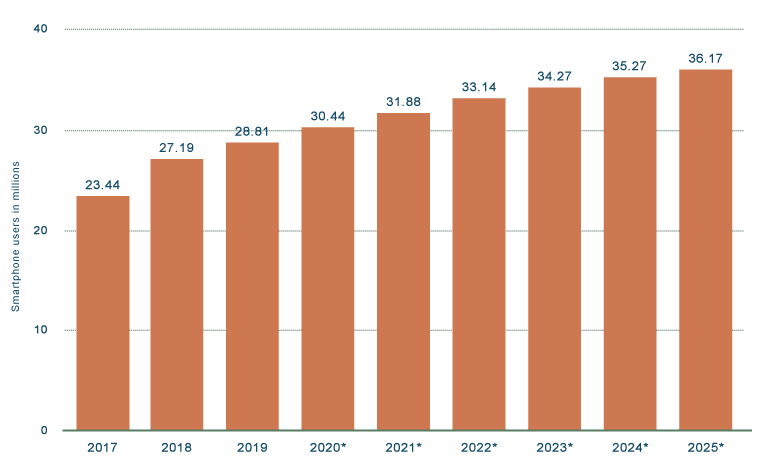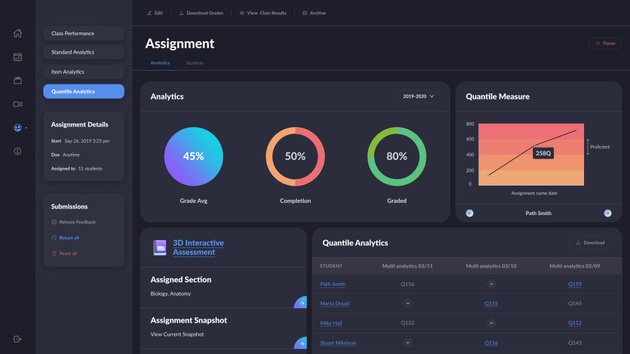The COVID 19 pandemic created a seismic shift from the norm and a deviation from the already known learning method to a flexible one that has defied all odds. The introduction of E-learning, a new form of organization of the educational process, based on the independent study work of students with the help of developed electronic educational resources.
Since its inception, eLearning has been a growing feature of internet advancement. The knowledge economy, together with its accompanying act, i.e., the e-learning economy, has been growing steadily over time, with the world e-learning valued at USD 214 billion in 2021 and projected to be worth $325 Billion in 2025.
eLearning market & Its categories
In the previous article, we have introduced eLearning and its categories. Here is an overview of these concepts.
eLearning, a short form of electronic learning, combines the capabilities of electronic devices such as smartphones and computers with academic materials to create a virtual space where knowledge can be exchanged. It integrates various methods and forms of the educational process and gives them a qualitatively new level.
A distinctive feature of e-learning is to provide students with the opportunity to acquire the required knowledge using advanced information resources.
The categories of eLearning are:
Educational eLearning
This aspect focuses on tech companies that combine computer hardware with learning management systems to create a virtual platform where students can learn.
Educational institutions expand their usage of eLearning platforms to aid learning during the pandemic, which has been effective even post Covid’19. The Educational e-learning courses capture and retain users’ attention through pictorial representations, short video forms, and quizzes. They also track each student’s progress using the platforms and draw out helpful analytics that can be used to improve the learning process.
Corporate eLearning
When we talk about eLearning, it’s not restricted to academic work alone, but corporate organizations also adopt this platform to train their staff due to its flexibility.
Corporate eLearning platforms are specific to each organization that uses them to create a study environment for their employees. E-Learning helps corporate employees sharpen their skill set and identify talent within the ecosystem, culminating in increased productivity and generating more revenue for the organization. Going by this trend, the corporate e-learning market could increase by $38.09 billion between 2020 and 2024.
eLearning markets in the Middle East including UAE & Saudi Arabia
First, we evaluate educational technology in developing markets. The Middle East has a sizeable portion of the eLearning economy though it is small compared to developed economies.
Saudi Arabia has a robust eLearning market. This is a result of continuous investment in digital and sophisticated technologies caused by the pandemic. And this made Saudi Arabia the most significant shareholder of eLearning in the middle east.
The low contribution of other middle east countries is due to lower penetration of the internet in the region, which further crippled their development and affected them extensively during the pandemic. The post-pandemic days have seen this region’s governments investing in the e-learning market.
With an internet penetration of 100% and 98%, respectively, for the United Arab Emirates (UAE) and Saudi Arabia, the market share of both countries’ e-Learning is less than USD 10 billion. This figure ranks them at the peak among nations in the Middle East but still far off the figure of North America, which stood at USD 94 billion.
If we consider the population of both countries, then we can say they have done considerably well in growing their eLearning markets.
With a projected compound annual growth rate(CAGR) of 16.05% for Saudi Arabia during 2022-2027, there is a call for calculated optimism. This is made possible through the increased spending by government bodies in the education sector.
Pre pandemic perception about eLearning platforms in the Middle East
The COVID 19 pandemic significantly accelerated investment in e-Learning platforms compared to the pre-pandemic era.
The restriction on human movement across borders shook the entire system—the urgent need to promote eLearning platforms to bridge the knowledge gap increased investment in the education sector.
The resulting variants of the COVID 19 disease mean many of the population are locked indoors for an extended period. Then the culture of online classes and learning management systems (LMS) has to be employed to teach future generations.
eLearning platforms have migrated to the cloud-based model, making information accessible irrespective of the region once there is internet penetration and smartphone.
The smartphone penetration keeps growing year by year in the Middle East, allowing the light of education to shine at every corner. For example, 78.86% of the population in Saudi Arabia uses smartphones.

The growing need for a learning management system to adopt a custom-made platform for education is also catered for by adequate investment put in by various governmental bodies to rejig the education sector.
The benefits cannot be overestimated as it is a vital tool in breaking knowledge barriers, especially in developing economies.
The benefits of eLearning platforms
Currently, the system of e-learning is actively developing in various fields of education. Now it is no longer a problem to receive a full-fledged education in almost any subject remotely in the face of time constraints. The benefits of e-learning include:
- The one-on-one interactive atmosphere created by the learning platform whereby each student’s academic progress can be monitored, analyzed, and results used to improve physical class learning.
- Using well-trained tutors by eLearning platforms has also helped simplify complex topics to further aid learning.
- Higher institutions of learning through the eLearning platforms have been able to collaborate with other institutions to share ideas, and academic personnel that would have had to travel physically to other institutions do not need to do so anymore since these platforms provide means where they can share audiovisual materials to further academics and research in the education ecosystem.
- In the workplace, companies continually adopt this method to train their employees as it saves time, cost, and space, which would have been a significant issue if physical training had been conducted.
Challenges of eLearning software in developing markets
Although the development and innovation technologies are driving many in eLearning. There are still challenges of eLearning software in the development market. These challenges include:
Conclusion
The scope of eLearning platforms is widening daily. Education and corporate organization keep adopting these technologies to advance academic and personnel development. Education is improving through Edutech software, and the learning economy is expected to grow accordingly.
The need for more investment in eLearning is growing in a post-pandemic world, and not only that, the need to create custom-made education platforms that suit each specific region and organization is even more glaring to explore the rich benefits of these platforms.
Therefore Aristek systems is fully committed to achieving this goal. Our experience garnered through extensive field study gives us an edge over other platforms. We understand your terrain and are fully equipped to create a custom-made learning management system that will suit your academic and professional needs.





